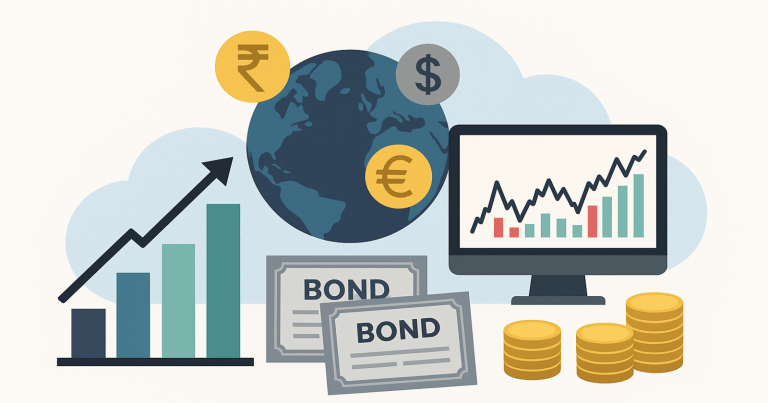A financial market connects people who have money with those who need it. It helps individuals invest their savings and allows businesses to raise funds for growth. People buy and sell financial products like shares, bonds, and currencies in these markets. Financial markets support the economy by moving money to the right places at the right time. They help create jobs, build infrastructure, and improve income levels. In India, markets like NSE and BSE help millions invest and grow their wealth.
What is the Financial Market?
A financial market is a place where people trade financial assets like shares, bonds, currencies, and commodities. It connects people who have extra money with those who need money for business, projects, or other goals. These markets help smoothen the flow of funds in the economy.
In a financial market, buyers and sellers come together to do financial transactions. Some people want to invest and earn returns, while others want to raise funds for growth. Financial markets help both sides meet their needs. These markets are not only physical places like stock exchanges but also online platforms where trading happens in real-time.
Financial markets include:
- Stock markets, where people buy and sell shares of companies
- Bond markets, where companies and governments borrow money
- Currency markets, where foreign exchange takes place
- Commodity markets, where goods like gold and oil are traded
- Derivatives markets, where people trade contracts based on future prices
In India, major financial markets include the Bombay Stock Exchange (BSE), National Stock Exchange (NSE), and Multi Commodity Exchange (MCX). These markets are regulated by bodies like SEBI (Securities and Exchange Board of India) to keep them fair and safe for everyone.
Types of Financial Market
Financial markets are not all the same. Each market serves a unique purpose. Some handle long-term investments. Some deal with short-term borrowing. Others focus on trading currencies or managing risks. In India and around the world, these financial markets are the backbone of the economic system.
They help in collecting savings from people and channeling them to industries, governments, and institutions. Each type plays a specific role in supporting the economy and helping individuals or organizations meet their goals. Let us now look at each type of financial market in depth.
Capital Market
Capital markets are for long-term funds. When companies or the government want money for five years or more, they go to the capital market. It is mainly for raising capital through shares or bonds. Following are the types of capital market:
1. Primary Market
The primary market is where new securities are issued. Companies raise money directly from investors by selling new shares through Initial Public Offerings (IPOs). This helps them start new projects or expand.
- For example, when Zomato issued its IPO, it raised fresh money from the public.
- Investors buy shares directly from the company.
- Once shares are sold, they are listed on the stock exchange.
2. Secondary Market
After the shares are issued, they are traded among investors in the secondary market. The company does not get this money again, but the trade helps in price discovery and liquidity.
- Shares bought in an IPO can now be sold to others.
- Examples of secondary markets in India include the BSE and NSE.
- Prices here depend on demand and supply.
The capital market helps in mobilizing long-term capital. It is used by industries, service sectors, and even the government. Investors also benefit as they get returns through capital gains and dividends.
Money Market
The money market is for short-term needs. It deals in funds for less than one year. It is mainly used by banks, financial institutions, large corporations, and the government to manage daily liquidity needs.
This market is not directly accessible to small investors. It runs on huge volumes and low risks. The returns are not very high, but they are safe.
Instruments of Money Market are as follows:
- Treasury Bills (T-Bills): Issued by the government. They are safe and mature in 91 to 364 days.
- Commercial Papers (CPs): Issued by companies to meet short-term needs.
- Certificates of Deposit (CDs): Issued by banks to raise funds for a fixed time.
- Call Money: Overnight money used between banks.
This market supports the banking system and ensures there is no shortage of cash for day-to-day work.
Foreign Exchange Market (Forex Market)
The foreign exchange market is where people trade currencies. It is the world’s largest market and works 24 hours a day. It helps in currency conversion, international trade, and global investment.
In India, the forex market is regulated by the Reserve Bank of India (RBI). Travelers, importers, exporters, and multinational companies all use the forex market.
Key Features
- It is decentralized and online.
- Traders buy one currency by selling another.
- Exchange rates change every second based on supply and demand.
- The Indian Rupee (INR) trades against currencies like USD, EUR, GBP, and JPY.
The Forex market supports India’s international trade. When a business imports goods, it needs dollars. The forex market gives them the currency they need.
Derivatives Market
The derivatives market is used to manage future risks. It deals in contracts whose value depends on another item, like stocks, interest rates, or currencies.
These contracts include:
- Futures Contracts: Agreement to buy or sell an asset at a future date at a fixed price.
- Options Contracts: Give the right but not obligation to buy or sell at a future date.
- Swaps: Used mainly by financial institutions to manage interest rates or currency risks.
Why It Matters
- Helps in hedging or protecting investments.
- Allows investors to bet on future price movements.
- Increases market efficiency.
In India, derivatives are mainly traded on the NSE and BSE. These instruments are more complex and are often used by professionals or experienced investors.
Commodity Market
Commodity markets help in the buying and selling of raw materials. This includes agricultural products, metals, and energy. People invest in commodities to diversify their portfolios or hedge against inflation.
Common Commodities Traded
- Metals: Gold, silver, copper
- Energy: Crude oil, natural gas
- Agriculture: Wheat, rice, sugar, cotton
In India, MCX (Multi Commodity Exchange) and NCDEX (National Commodity & Derivatives Exchange) are the two main commodity exchanges.
Uses of Commodity Market
- Farmers use it to fix prices in advance.
- Traders use it for profit.
- Investors use it to protect value during inflation.
India, being an agricultural economy, is highly involved in commodity trading. It provides price stability and risk protection to both farmers and consumers.
Cryptocurrency Market (Emerging Type)
Though not traditional, the cryptocurrency market is gaining attention. People trade digital coins like Bitcoin, Ethereum, and others. These markets are still new in India and are not fully regulated.
- Trades happen online through crypto exchanges.
- Prices are very volatile.
- Governments are discussing laws to control it.
Many Indian youth show interest in cryptocurrency. However, since it carries high risks, proper knowledge is required before investing.
Real Estate Market (Alternative Financial Market)
Real estate is where people buy and sell property. While it is not an exchange-based market, it plays a big role in investment and finance.
- Builders raise funds through real estate markets.
- Investors buy properties for rental income and long-term gains.
- Real Estate Investment Trusts (REITs) are new financial tools tied to property investments.
It adds to national income, supports the construction sector, and creates jobs.
Importance of Financial Market
A financial market is not just a place to buy and sell. It plays a big role in how the economy works. It helps everyone—from the commoner to big companies and the government.
In India, where savings are high, but investment knowledge is still growing, financial markets guide how money moves. People put their savings in banks, mutual funds, and shares. On the other side, companies use these funds to create jobs and grow the economy. This smooth money movement happens because of financial markets.
Let’s break down why financial markets matter so much:
Helps in Economic Growth
Financial markets bring savings and investments together. This allows businesses to get the funds they need to grow. More businesses mean more jobs. More jobs mean more money in people’s hands. That is how financial markets help the economy grow.
Mobilizes Savings
If people keep money at home, it does not grow. But when they invest through the financial market, the money grows. These investments help build roads, schools, and factories. This is how the market turns savings into real growth.
Creates Liquidity
Liquidity means how quickly you can turn an item into cash. Financial markets give you that power. You can sell shares or bonds and get money fast. This helps people feel safe while investing.
Helps in Price Discovery
Prices of shares, gold, and currency keep changing. These changes happen in the financial market. The market sets prices based on supply and demand. This is called price discovery. It helps buyers and sellers know the real value.
Gives Investment Choices
Financial markets offer many options. You can choose shares, bonds, gold, or mutual funds. This helps people invest as per their goals. Young people can take risks. Older people can play safe.
Improves Corporate Governance
When companies raise money from the public, they must follow the rules. They must share reports and updates. This brings discipline. It improves how companies behave with money.
Functions of Financial Market
A financial market does many things. These functions help run the economy and give investors a chance to grow their money.
Each part of the market plays a unique role. From raising funds to managing risks, financial markets serve every need. Let’s look at what functions they perform.
Fund Raising
One big function of a financial market is to help companies and the government raise money. They issue shares or bonds, and investors buy them. This gives funds to those who need them.
Risk Sharing
Investing always involves risk. Some people can take high risks, and others want low risks. Financial markets offer all types of products. You can choose what suits you. You can even use tools like derivatives to reduce risks.
Returns on Investment
People want to grow their money. Financial markets offer this chance. You can earn profits, interest, or dividends. You can sell your investment when prices go up. This gives you returns on your savings.
Information Sharing
Companies and governments share financial reports. Markets provide price data and expert views. This helps people make smart choices. When people stay informed, they invest better.
Financial Market FAQs
1. What is the financial market?
A financial market is a system where people buy and sell financial products like stocks, bonds, and currencies.
2. What are the main types of financial markets?
The main types include capital markets, money markets, foreign exchange markets, derivatives markets, and commodity markets.
3. Why is the financial market important?
It helps grow the economy, moves savings to investment, and offers returns to investors.
4. Who regulates financial markets in India?
SEBI (Securities and Exchange Board of India) manages and monitors India’s financial markets.
5. How does a financial market help investors?
It gives options to grow money, manage risk, and stay liquid through shares, bonds, and mutual funds.
6. What is the difference between capital and money market?
The capital market is for long-term funds. The money market is for short-term funds.


